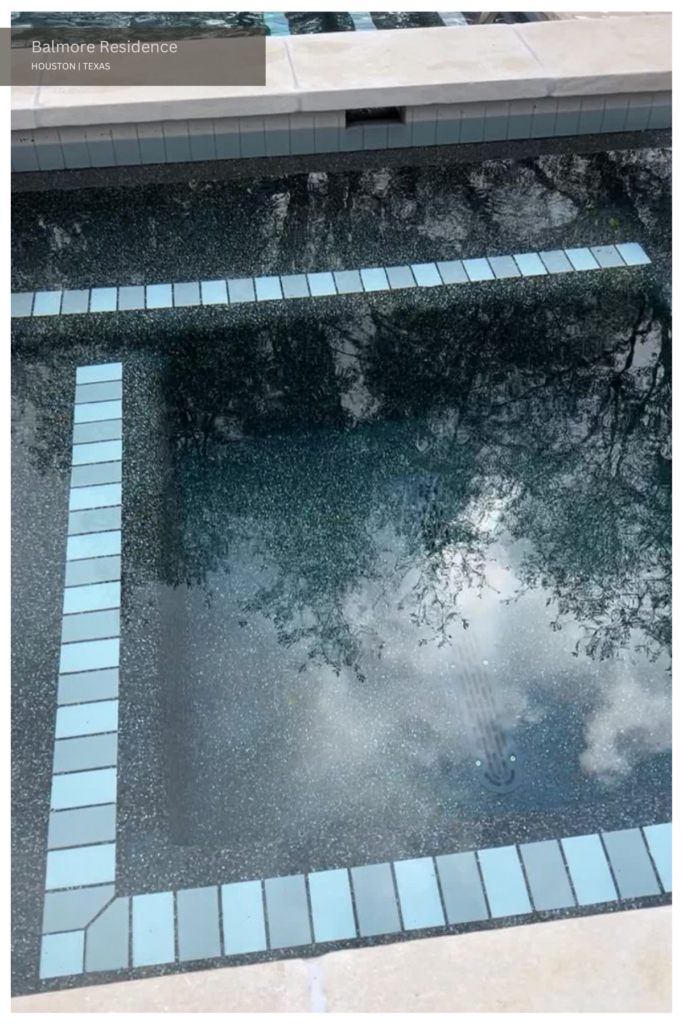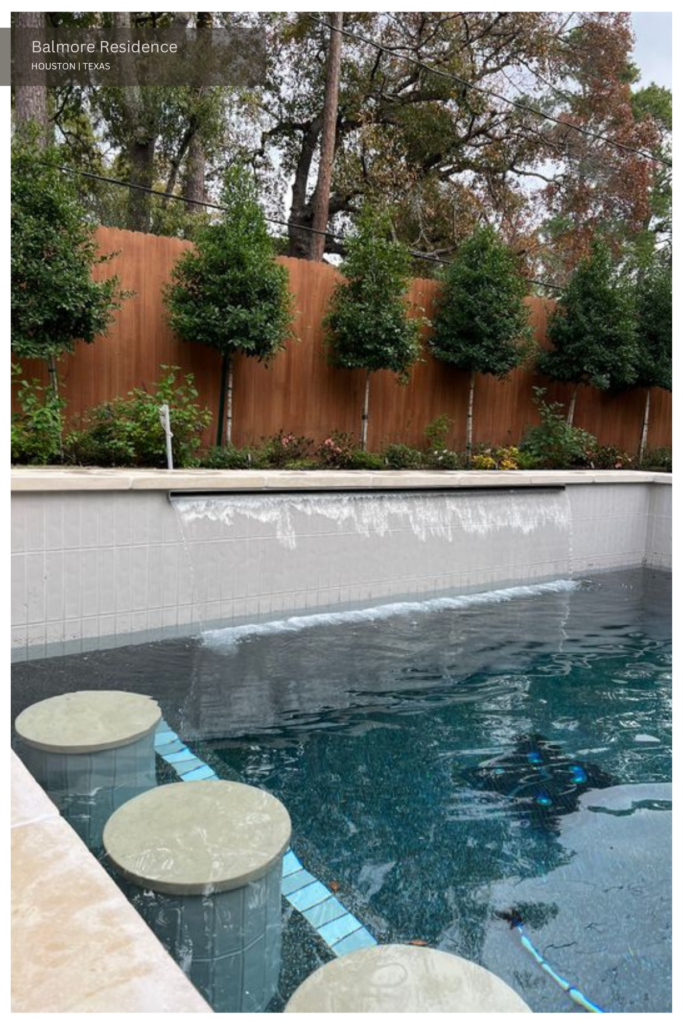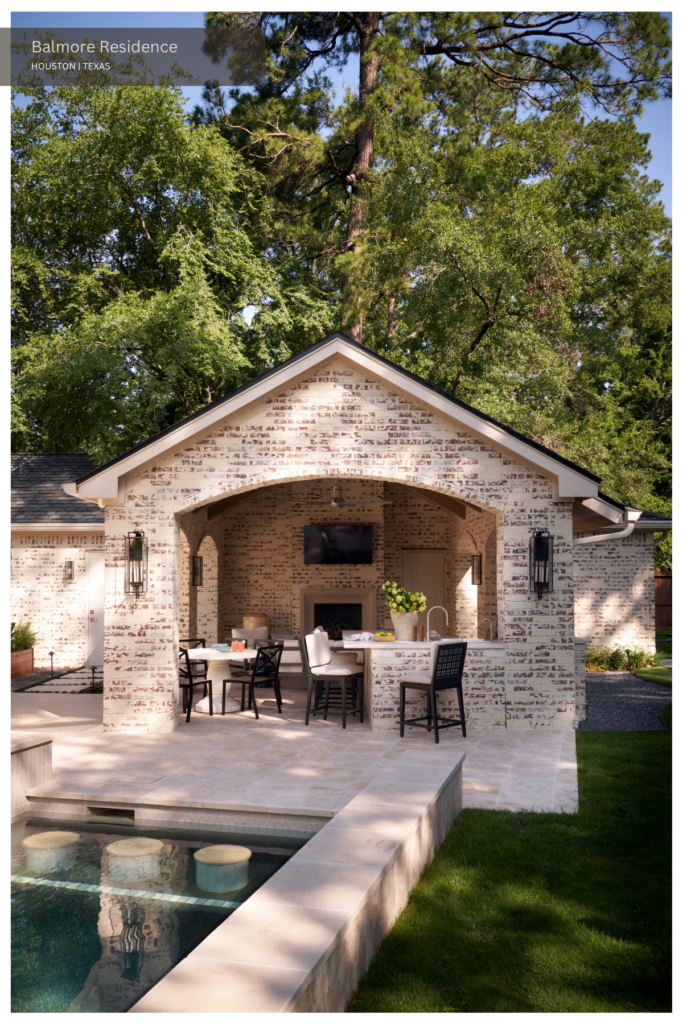Readers of our Journal will already know that the LUDC team recently completed a gorgeous outdoor design project at Balmore. This project included everything from a loggia with its own outdoor kitchen to a putting green to an expansive swimming pool designed with accessibility and aesthetics in mind. From glittering glass to mosaic murals to elegant porcelain, the aesthetic value of pool tiles might be top of mind for you. However, the right pool tiles also enhance safety, comfort, and ease of maintenance. Given the wide variety of materials to choose from, working with a designer can make an enormous difference in the eventual look and feel of your swimming pool. With many pool designs under our team’s belt at LUDC, we feel qualified to guide you through the selection process. Read on to learn more!
Here Are Your Material Options for Swimming Pool Tiles

When selecting the right material for your pool tiles, prioritize aesthetic continuity, ease of care, budget, slip resistance, and durability. First, be sure to assess the overall design and theme of your outdoor space. The tile material you choose should complement the style of your home and your backyard oasis.
You must also evaluate the durability and maintenance requirements of each tile type—especially if your pool will be exposed to harsh weather or heavy use. A designer can help you determine the appropriate material for areas that experience freezing temperatures during the winter or high heat during the summer. For example, designers often recommend frost-proof porcelain tiles, which are highly durable, dense, and have low water absorption rates.
Of course, safety and accessibility are also key. Prioritize slip-resistant surfaces—particularly for areas like steps and pool decks. If budget is a concern, be aware that luxurious options like glass and stone may offer stunning visuals but ceramic and porcelain tiles are excellent cost-effective, durable alternatives.
Lastly, think about the long-term maintenance and how much effort or expense you are willing to undertake in keeping your tiles pristine. Again, consulting with a professional can provide valuable insights tailored to your specific needs and preferences—helping you make an informed decision that enhances the beauty and functionality of your pool. With all that said, below are your tile material options for swimming pools.
Ceramic and Porcelain Tiles

Ceramic and porcelain tiles are popular choices for pool areas because of their durability, water resistance, and affordability. Porcelain tiles are denser and less porous than ceramic tiles, which means that they more suitable for areas constantly exposed to water.
Both types are perfect as both pool waterline tile and pool floor tile as they are also resistant to fading and chemical damage from pool treatments. Their non-porous nature makes them less likely to absorb water—thereby reducing the risk of mold and mildew.
Glass Tiles
Homeowners love glass tiles because of their vibrant colors, reflective properties, and versatility. They are impervious to water, which makes them an excellent choice for pools. Glass tiles are resistant to staining, fading, and chemical damage. Their translucence and ability to catch and reflect light can create stunning visual effects—both above and under water.
Glass pool tiles are often used for decorative accents, waterlines, and pool interiors. They can create shimmering mosaics and intricate patterns that can make any pool more interesting and elegant. Common glass pool tile designs include iridescent finishes, bold colors, and mosaic arrangements that can be customized to create unique artistic expressions in the pool area.
Stone Tiles

Stone tiles bring a more natural, earthy aesthetic to pool areas. Materials like travertine, slate, and granite are commonly used due to their durability and timeless beauty. Stone tiles are naturally slip-resistant and can withstand harsh weather conditions. They also provide a cool surface underfoot, which makes them most comfortable for barefoot traffic around the pool.
Stone tiles are perfect for pool decks, coping, and water features. Their natural textures and variations in color add a rustic, organic feel to the outdoor space. Homeowners can choose between rough-hewn finishes for a more rugged look and honed surfaces for a smoother, polished appearance. Stone tiles can be arranged in patterns or left in their natural shapes.
Mosaic Tiles
Mosaic tiles are small tiles made of glass, ceramic, or stone that are then arranged in intricate patterns or images. They offer unparalleled design flexibility and can create detailed, eye-catching designs that become the focal point of the pool area. Mosaic tiles are durable, easy to clean, and resistant to water and chemical damage.
Mosaic tiles are perfect for your pool’s waterline and for submerged applications. They can be used to create anything from simple geometric patterns to complex scenes and elaborate murals. Consider adding similar shower tiles in your pool house for a cohesive look.
Opportunities to Enhance the Aesthetic Appeal of Your Swimming Pool

Not sure where to put pool tile? Let’s start with waterline tiles. This area at the top of the pool wall—just above the water level—is often tiled to keep the pool clean by reducing the formation of scum lines while adding a decorative element. The pool floor is also frequently tiled.
Tiling the pool walls not only prevents algae build-up but also enhances its aesthetic appeal. If your pool features a spillover spa, tiling the edges and walls to match the pool can create a cohesive and luxurious look. Similarly, the overflow channel is often tiled to match in infinity pools.
What About Safety and Accessibility?
For safety and visibility, tiles are often used on steps and benches. When a designer or homeowner selects the right tile for this area of the pool, they create a non-slip surface and make the edges more noticeable for those with visual impairments.
Similarly, swim-up bars can also be enhanced with tiled countertops and seats for enhanced safety, durability, and aesthetic appeal. When thoughtfully tiled, each of these areas can transform your pool design into a stunning outdoor retreat.
Answering All Your FAQs About Selecting Pool Tile for Your Home
How Much Does Pool Tile Installation Cost?
The cost of installing pool tiles varies widely based on tile type, pool size, design complexity, and regional labor rates. On average, ceramic and porcelain tiles range from $15 to $35 per square foot (including materials and labor), glass tiles from $35 to $65 per square foot, stone tiles from $25 to $55 per square foot, and mosaic tiles from $45 to $90 per square foot.
For a standard-sized pool, this can result in total installation costs ranging from $9,000 to $72,000. Your design team will request quotes from several professional installers to obtain accurate, affordable estimates for your specific project.
How Do I Select the Appropriate Pool Tiles?

Consider factors such as durability, slip resistance, maintenance, budget, and overall design aesthetics. Think about the specific areas where the tiles will be used, such as the waterline, pool floor, walls, steps, and feature walls.
How Should I Clean and Maintain My Pool’s Tile?
Regular cleaning with mild detergent and a soft brush is usually sufficient to keep pool tiles clean. For stubborn stains or calcium deposits, specific pool tile cleaners may be required. Maintaining proper water chemistry can also prevent buildup and discoloration.
How Long Do Pool Tiles Last Before They Must Be Replaced?
High-quality pool tiles can last for many years with proper care and maintenance. Durability varies by material, with porcelain and glass tiles typically being more durable than ceramic tiles.
Can Homeowners Install Pool Tiles Themselves?

While it is possible to install pool tiles yourself, professional installation is recommended to ensure proper adhesion, waterproofing, and alignment. Improper installation can lead to tiles falling off or water seeping behind them.
Are Eco-Friendly Pool Tile Options Available?
Yes, recycled glass tiles are an eco-friendly option. They are made from post-consumer and post-industrial glass, reducing waste and the environmental impact of producing new materials.
Can I Use Any Type of Tile for My Pool?
Put simply, no. It is incredibly important to use tiles specifically designed for pool use. Pool tiles are made to withstand constant exposure to water, chemicals, and varying temperatures. Regular indoor tiles may not have the necessary durability and water resistance.
Enhance Your Outdoor Space with the Perfect Pool Tile This Summer

Collaborating with a professional designer when creating your outdoor space and pool is invaluable. Designers bring a wealth of expertise in selecting materials and crafting layouts that balance aesthetics, functionality, and safety.
A designer’s eye for detail ensures that every aspect contributes to a cohesive and inviting atmosphere. Plus, their knowledge of the latest trends and technologies can introduce innovative solutions that you might not have considered. If you are ready to transform your home’s backyard into a stunning retreat that suits your family’s needs, reach out to our team at LUDC.


